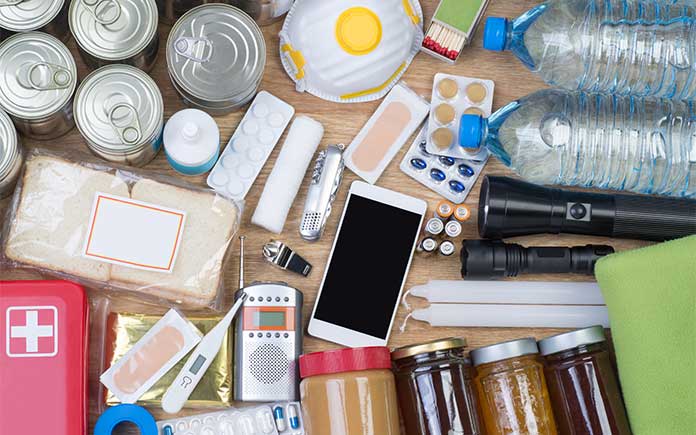Preparing a hurricane supply list is the first step when planning for a natural disaster that could leave you without power and other vital resources for days. Given the severity of some storms, preparation could not be more critical.
When severe weather hits, you can’t take anything for granted. For more information on hurricanes and other natural disasters, read Statistics and Facts of Natural Disasters.
5 Essentials to Have Before a Hurricane
Preparing for a hurricane requires gathering important items before a storm even grows into a threat. Having these essentials on hand will help you ride out a hurricane and any after-effects:
Having enough water is crucial, with a goal of 1 gallon per person per day for at least three days and ideally for up to two weeks. Stock up on bottled water or fill pitchers, pots, tubs, or other containers.
Stock up on canned goods, protein bars, dried foods, nuts and canned meats. Try to have enough food for your family for three or more days. Prioritize nutrient-dense foods.
Make sure you have extra batteries. Updates after the storm will likely come via radio when other electricity sources fail. Flashlights provide light.
Gather first aid supplies to treat any minor or major injuries independent of emergency responders if needed. Essentials include bandages, antiseptic, gloves, and medications.
Have cash in hand if power outages prevent using credit cards or accessing ATMs. Banks and stores may be closed for days after the storm. Small bills (nothing bigger than a $20 bill) are best for buying essential supplies from open stores.
Natural Disasters: Dangerous and Unpredictable
You never know when banks and gas stations will open after severe weather. The best thing to do is prepare for them to be closed.
That means having enough cash on hand, as well as having filled gas cans, food, and bottled water when external supplies are limited.
Grocery stores have no obligation to open during or after a hurricane.
Employees also need to shelter or evacuate, so you can assume grocery stores will close in this event. If you have not thought of that, download the Hurricane Supply List to prepare.
Communication Is Key
Even though we can track them and plot their projected paths, hurricanes are still unpredictable. So is their effect on how communities deal with them. Staying updated on the storm’s progress is vital for making decisions about closing roads, schools, and businesses and opening shelters and emergency centers.
Keep a battery-powered radio and a fully charged cell phone to communicate with family and friends.

From experience, I know it can be difficult to remember to update loved ones during an emergency since you are so worried about keeping yourself and your family safe.
Remember to let loved ones know you’re safe.
Protecting Your Home
You also need duct tape, rope, plywood, and tarps to protect your home. These items may seem overwhelming but don’t worry. We have simplified hurricane preparation so you can focus on essential supplies. Download the Hurricane Preparedness Checklist to ensure you have what you need!
Conclusion
Preparing for a hurricane takes effort, but having supplies makes a difference when severe weather hits. Use our checklist for items like food, water, cash, and communication devices. Protecting your home also minimizes damage. With preparation, you can endure a hurricane safely.
Frequently Asked Questions
When should I start preparing?
Review emergency plans and restock supplies as soon as hurricane season begins, allowing time in case a storm develops quickly.
What food should I stock up on?
Non-perishable foods not requiring refrigeration or cooking are best, like canned goods, dried fruits, nuts, granola bars, and peanut butter. Also, get a manual can opener to ensure you can open your cans.
How much water is needed?
Have at least 1 gallon of water daily per person for three days minimum. A family of four should store 12 gallons plus more for pets.
What should a hurricane kit include?
In addition to food/water, ensure having flashlights, batteries, first aid, medications, weather radio, masks, disinfectants, and copies of documents in waterproof bags.
When should I start preparing?
Review emergency plans and restock supplies as soon as hurricane season begins, allowing time in case a storm develops quickly.











